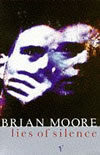
Lies of Silence
By Brian Moore
Brian Moore's Lies of Silence is a short novel about a love affair told in spare and simple prose. The manager of a Belfast hotel is held hostage by the IRA and given an impossible task: he must agree to plant a bomb in his own hotel, which will slaughter a Protestant reverend and his group of supporters, or the IRA will kill his wife, whom they also hold. To complicate the matter, the hotel manager has been thinking about leaving his shrewish wife for a woman he loves. The moral dilemma is excruciating. My breath was tight and short during the reading of this electric novel, and its ending is the most shocking—and entirely earned—of any book I have ever read.
By Brian Moore
Brian Moore's Lies of Silence is a short novel about a love affair told in spare and simple prose. The manager of a Belfast hotel is held hostage by the IRA and given an impossible task: he must agree to plant a bomb in his own hotel, which will slaughter a Protestant reverend and his group of supporters, or the IRA will kill his wife, whom they also hold. To complicate the matter, the hotel manager has been thinking about leaving his shrewish wife for a woman he loves. The moral dilemma is excruciating. My breath was tight and short during the reading of this electric novel, and its ending is the most shocking—and entirely earned—of any book I have ever read.
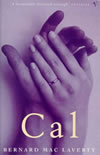
Cal
By Bernard MacLaverty
I must like short, spare novels about love affairs, because another of my favorites is Cal, by another Irish writer, Bernard MacLaverty. A reluctant IRA soldier, Cal, is the getaway driver during the killing of a Protestant policeman. Cal is later attracted to a librarian at his local library, at first not realizing she's the policeman's widow. He seeks her out despite learning that she is, in fact, the dead man's wife, and he becomes too emotionally involved to remove himself from her life. We know the situation, but the widow does not, a brilliant device that ratchets up the tension and delivers a clever twist on the time-honored story of Romeo and Juliet.
By Bernard MacLaverty
I must like short, spare novels about love affairs, because another of my favorites is Cal, by another Irish writer, Bernard MacLaverty. A reluctant IRA soldier, Cal, is the getaway driver during the killing of a Protestant policeman. Cal is later attracted to a librarian at his local library, at first not realizing she's the policeman's widow. He seeks her out despite learning that she is, in fact, the dead man's wife, and he becomes too emotionally involved to remove himself from her life. We know the situation, but the widow does not, a brilliant device that ratchets up the tension and delivers a clever twist on the time-honored story of Romeo and Juliet.
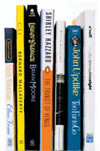
Swimmer in the Secret Sea
By William Kotzwinkle
William Kotzwinkle's Swimmer in the Secret Sea first appeared in Redbook in 1975 and was subsequently published alone in a single slim volume. It is the tale of a young couple who live in a northern woods and are on the brink of giving birth to their first child. I cannot bear to tell you here what happens; suffice it to say that there is not a single unnecessary word in this exceptional tale. It can be read in about an hour. I know this because I once read it aloud to a writing class, and at the end of the hour, there wasn't a dry eye in the room.
By William Kotzwinkle
William Kotzwinkle's Swimmer in the Secret Sea first appeared in Redbook in 1975 and was subsequently published alone in a single slim volume. It is the tale of a young couple who live in a northern woods and are on the brink of giving birth to their first child. I cannot bear to tell you here what happens; suffice it to say that there is not a single unnecessary word in this exceptional tale. It can be read in about an hour. I know this because I once read it aloud to a writing class, and at the end of the hour, there wasn't a dry eye in the room.
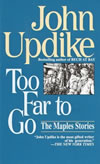
Too Far to Go
By John Updike
Early in my career as a writer—and as a reader—I came across a piece by John Updike collected in the 1976 edition of the O. Henry Prize stories. Entitled "Separating," it's about a couple trying to tell their children at the dinner table that they are going to separate. The effect of the short story on me was immediate and visceral. I began to cry before I'd finished the first page. The heartache of the father as he has to tell his four children that their family (as they have known it) is now over is beautifully rendered. Ten years later, I remembered that experience and wondered, in a more technical sense, what had so powerfully triggered my emotional response? I decided to take a cold, hard look at the work. I hadn't reached the bottom of the first page before I was again overcome. If ever there was an example of the power of the written word to evoke strong emotion, I believe this is it. ("Separating" can be found in Too Far to Go.)
By John Updike
Early in my career as a writer—and as a reader—I came across a piece by John Updike collected in the 1976 edition of the O. Henry Prize stories. Entitled "Separating," it's about a couple trying to tell their children at the dinner table that they are going to separate. The effect of the short story on me was immediate and visceral. I began to cry before I'd finished the first page. The heartache of the father as he has to tell his four children that their family (as they have known it) is now over is beautifully rendered. Ten years later, I remembered that experience and wondered, in a more technical sense, what had so powerfully triggered my emotional response? I decided to take a cold, hard look at the work. I hadn't reached the bottom of the first page before I was again overcome. If ever there was an example of the power of the written word to evoke strong emotion, I believe this is it. ("Separating" can be found in Too Far to Go.)
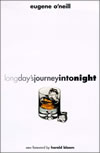
Long Day's Journey Into Night
By Eugene O'Neill
One of my favorite pieces of arresting fiction is a play: Long Day's Journey Into Night by Eugene O'Neill. I read this while still in high school and was so moved and intrigued by the wrenching and entangled relationships within a family during a single day at a vacation house in New England that I then set out to read everything Eugene O'Neill ever wrote. I'd never done that before—systematically tackling one author's oeuvre—and I'm not sure I've done it since. None of the other plays was quite as moving as the first, but I found much that amazed me—both in the work and, later, in the life of O'Neill himself, my first introduction to the romantic angst of a tragic writer, something that in my teens (though decidedly not now) I desperately wanted to be.
By Eugene O'Neill
One of my favorite pieces of arresting fiction is a play: Long Day's Journey Into Night by Eugene O'Neill. I read this while still in high school and was so moved and intrigued by the wrenching and entangled relationships within a family during a single day at a vacation house in New England that I then set out to read everything Eugene O'Neill ever wrote. I'd never done that before—systematically tackling one author's oeuvre—and I'm not sure I've done it since. None of the other plays was quite as moving as the first, but I found much that amazed me—both in the work and, later, in the life of O'Neill himself, my first introduction to the romantic angst of a tragic writer, something that in my teens (though decidedly not now) I desperately wanted to be.
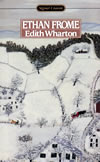
Ethan Frome
By Edith Wharton
It was also in high school that I read Ethan Frome by Edith Wharton. Each of us has a work that first introduced the joys of reading, and for me this is it. I'd been assigned the book for English class and had left it until the last possible minute—a snowy Sunday afternoon. I began to read, rather grudgingly at first, about a ruined man glimpsed by the narrator on the steps of a post office. Immediately, the narrator (and the reader) begins to wonder what could possibly have happened to this man to cause him to look so ravaged at the age of 52. I was drawn in; I was enthralled; I was knocked out. The universe within Wharton's enduring tale is snowbound and isolated, just as frozen and stark as the world outside my window that day. Never before had I experienced reality and fiction merging so powerfully. I have said often that this book was the beginning of my life as a novelist. Certainly, it was the beginning of my lifelong addiction to reading.
By Edith Wharton
It was also in high school that I read Ethan Frome by Edith Wharton. Each of us has a work that first introduced the joys of reading, and for me this is it. I'd been assigned the book for English class and had left it until the last possible minute—a snowy Sunday afternoon. I began to read, rather grudgingly at first, about a ruined man glimpsed by the narrator on the steps of a post office. Immediately, the narrator (and the reader) begins to wonder what could possibly have happened to this man to cause him to look so ravaged at the age of 52. I was drawn in; I was enthralled; I was knocked out. The universe within Wharton's enduring tale is snowbound and isolated, just as frozen and stark as the world outside my window that day. Never before had I experienced reality and fiction merging so powerfully. I have said often that this book was the beginning of my life as a novelist. Certainly, it was the beginning of my lifelong addiction to reading.




